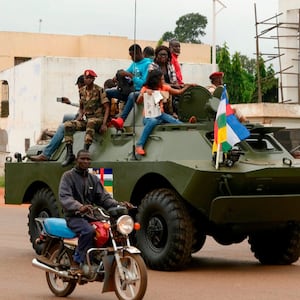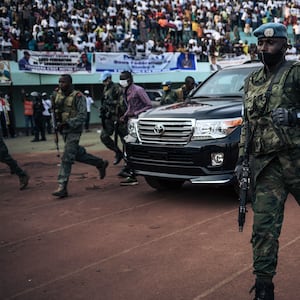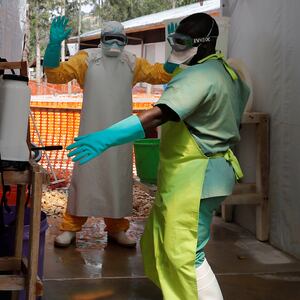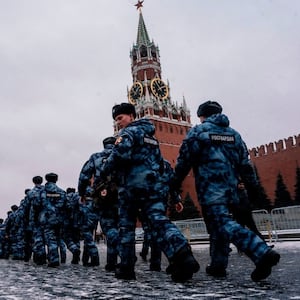ABUJA, Nigeria—On Dec. 5, Joël Bokadi received a WhatsApp message from a Nigerian phone number. It insisted that coronavirus vaccines produced by American companies can hurt people’s immune systems and are less effective than vaccines produced in Russia. As soon as he saw the message, Bokadi began to forward it to dozens of his contacts on the messaging app.
Within two days, Bokadi, who lives near Lwemba town in Democratic Republic of Congo's northeastern Ituri province, had forwarded the message to about 40 people across the restive district, where ethnic militia attacks have killed hundreds of civilians since March and displaced more than 200,000 people since the beginning of the year.
The suspicious message came with a link to a website purporting to provide “facts” on how Dr. Anthony Fauci, the director of the United States National Institute of Allergy and Infectious Diseases and a leading voice on the coronavirus, “buried research by a popular American female scientist that showed how vaccines can damage people’s immune systems,” Bokadi told The Daily Beast. “I believe the vaccines produced in America are dangerous and are aimed at reducing the world’s population.”
Messages falsely claiming that vaccines developed in the United States are unsafe and likely to fail are constantly being shared across the Democratic Republic of Congo (DRC). Some of this disinformation, including the one Bokadi has been sending to his contacts, comes from trolls in Africa who are linked to Russia.
An investigation by The Daily Beast found that content of the WhatsApp message Bokadi received on Dec. 5 is exactly the same as what was contained in an article published the previous day by Opera News, a leading news and content app in Africa with 25 million monthly active users owned by China’s Golden Brick Capital private equity fund but headquartered in Norway.
The article, which had the headline, Why Africa should focus on Russia's Sputnik V vaccine, was written by Bill Gyado, a writer for Caliwax, a so-called media firm active in Nigeria and Ghana that The Daily Beast recently exposed to be a Russian-linked troll factory, which previously used young men and women in the two West African nations to spread disinformation about U.S. Democrats and amplify racial issues in America with the aim of instigating social unrest.
In the article, Gyado, who claimed in his LinkedIn profile that he lives in New York, argued that “Africa stands to gain more from choosing Russia’s Sputnik V vaccine than those produced in the Western world,” because more people “trust” the Russian vaccine and that it's a better option in terms of “cost effectiveness and efficacy.” The author, who has a history of promoting QAnon, the wild pro-Trump conspiracy theory, also gave the impression that even Bill Gates—who has committed hundreds of millions of dollars to fight the coronavirus pandemic through the Bill and Melinda Gates Foundation—doubts that people will be willing to take a vaccine produced in the U.S. when it becomes available to the public.
It’s not the first time Gyado’s misleading articles have been shared with Bokadi via WhatsApp using the same Nigerian phone number. A previous article he wrote in September suggested that Trump is fighting an evil cabal that controls so much of the world “from politicians to Hollywood and to the media” and another published in October claimed that Joe Biden as president would expand the U.S. Supreme Court with liberal justices and force countries in Africa to adopt rulings made by the court in the same way Barack Obama pressured African nations to legalize gay marriage.
Both of these articles were sent to the Congolese miner shortly after they appeared on Opera News, which allows authors and bloggers to create content and share it with a user base of more than 360 million users globally through its Opera News Hub platform. Both articles were later taken down by Opera, the global web innovation company that owns Opera News, after The Daily Beast informed it that they formed part of a Russian troll operation. This time around, the company did not respond to requests for comments regarding Gyado’s latest pro-Russia coronavirus vaccine write-up, which remained on the site at the time of publishing this story.
Instead, on Dec. 22, Opera published another article by Gyado with the headline, “The US could help Congo become the first in Africa administer COVID vaccine”, that misleadingly stated the United States used the DRC to experiment with the Ebola vaccine “despite the fact that there was an outbreak in West Africa between 2013 and 2016 before the pandemic affected the Democratic Republic of Congo in 2018” and could be looking to do same with the coronavirus vaccine because the DRC “seems to be a testing ground for American medical scientific innovation.” He also claimed in the article that vaccines produced by American pharmaceutical companies led to “severe side effects on patients,” whereas “almost no news of adverse effect on patients have been reported about vaccines produced in Russia.”
But whether or not Opera takes down Gyado’s misleading contents, the damage has already been done. Many of those who’ve come across disinformation about Western vaccines are convinced they are harmful and are passing on the same message to their family members and friends.
“There’s so much in the message I received that proves that vaccines produced in America can destroy people,” said Bokadi. “I’m hoping to forward it to as many people as possible to convince them that these [Western] vaccines are meant to harm and not protect people.”
In recent months, Russia has carried out a disinformation campaign aimed at promoting vaccines produced at home while undermining those developed in the West, particularly to countries across the developing world, according to a report by Politico which revealed that Russian-sponsored articles claiming that vaccine tests in the U.S. are harming locals have been widely shared across social media in Ukraine and that Moscow is pushing conspiracy theories in Georgia that Western nations are seeking to undermine global trust in COVID-19 vaccines.
Just days after Pfizer and BioNTech announced that interim results showed its vaccine was more than 90 percent effective, the Russian Direct Investment Fund (RDIF), which has been backing Sputnik V’s development, followed suit by announcing their vaccine had 92 percent efficacy. As soon as Pfizer raised its efficacy rate to 95 percent, the Russians announced that their vaccine had reached an efficacy of over 95 percent, making it clear that Moscow is rushing to keep pace with Western pharmaceutical companies in the race for a shot.
On Nov. 11, just two days after Pfizer and BioNTech announced the world’s first coronavirus vaccine, Russian state-owned news agency Sputnik published an article on its French-language site in which it cited a finding by British newspaper, The Daily Mirror, that revealed that the new coronavirus vaccine left patients with unpleasant sensations including pain, headaches and fever. The first five paragraphs of the Sputnik article, which focused mostly on the side effects of the treatment for a couple of volunteers, immediately began to circulate in the DRC, shared by so many through WhatsApp.
“The message was sent to me by someone using a Ghanaian phone number,” said Bokadi. “It was the first time I was receiving a message on WhatsApp from the number.”
The users of the Nigerian and Ghanaian phone numbers that messaged Bokadi declined to speak to The Daily Beast when contacted.
WhatsApp messages sent using foreign phone numbers have proven to be effective for sponsors of disinformation that target pandemics in the DRC—one of the world’s poorest nations despite boasting vast natural resources.
A little over a year ago, radio host Papy Mumbere Mahamba, who helped spread the word in the fight against Ebola, was stabbed to death at his home in Lwemba as health authorities were set to introduce a new vaccine against the disease in unaffected areas. The death of Mahamba, who had been working with the DRC health ministry’s Ebola response efforts to broadcast information on Radio Lwemba about the virus to the local community, came after a spate of fake news—some of it originating from West African phone numbers using WhatsApp—claiming that Ebola vaccines are dangerous and cause impotence and mental illness.
Messaging apps are adding to a common dynamic of rumor-mongering and gossip in the DRC, where internet penetration is low, with only 19 percent of the population estimated to have access. But in a province as restive as Ituri, where only the fortunate are likely to have access to the internet, apps like WhatsApp become a tool for strategic targeting of the population.
Since December 2017, armed groups, mainly from the Lendu ethnic farming community, have carried out attacks in the gold-rich Ituri province, which borders Uganda and South Sudan. They initially targeted members of the neighboring Hema community, who are predominantly herders, and the Congolese national army. But the attacks, which have left about 1,000 people dead and over half a million displaced in the last three years, have now become indiscriminate. The escalating violence has brought back historical rivalries between the Hema and Lendu, who fought each other during the 1999-2003 war that saw both communities participate in massacres undertaken by associated militias. The current conflict, which has attracted fighters from the adjacent province of North Kivu and from neighboring countries, has greatly destabilized the region and has created mistrust towards the Congolese government, which many accuse of being unable to secure the area.
“If the government that is unable to protect the people in this region says they are bringing a vaccine, we have to think carefully before taking it,” said Bokadi. “Because the Congolese government tends to accept anything that comes from the U.S., my fear is that if the Americans give us a vaccine that is bad, the government will accept without investigating because it doesn't want to hurt them.”
Fake news that originated from social media trolls funded by Russia's Internet Research Agency (IRA) played a role in the spread of disinformation about an Ebola vaccine during the 10th outbreak of the disease in northeastern DRC that began in August 2018 and ended in June this year. In December 2015, a number of Twitter accounts linked to the IRA, a notorious organization funded by Russian oligarch Evgeny Prigozhin (a close friend of President Vladimir Putin), posted about a supposed Ebola outbreak in Atlanta using the hashtag #EbolaInAtlanta, which trended for a while in the U.S. city. It turned out the story was false. But last December, WhatsApp messages that were widely shared in Ituri referenced the fake news as they claimed Ebola disappeared in Atlanta without anyone taking a vaccine and that the U.S. was working with the Congolese government to eradicate people in the opposition stronghold through a vaccination program.
“When I saw the message, I made up my mind that I was never going to take any Ebola vaccine,” said Bokadi. “I prefer to be killed by Ebola than to be killed by an American injection.”
Russian trolls also shared messages online falsely accusing the U.S. of bringing Ebola to West Africa in the early months of the 2014 outbreak of the disease, which killed over 11,000 people in the region, causing medical personnel to battle a spike in infections triggered by misinformation and fake reports.
In the DRC, WhatsApp, which is owned by Facebook and is by far the most popular messaging app in the country, often poses a huge problem for the country during pandemics. One study from the Harvard Humanitarian Initiative (PDF), which looked at over 80,000 WhatsApp messages sent across eight group chats within the first two months of the 10th Ebola outbreak—which affected 3,470 people and led to 2,287 deaths in northeastern DRC—found that about 10,400, or 13 percent of those messages, referenced or spread false information about the disease. In Ituri, for example, these messages contributed in creating a lack of community involvement by authorities and organizations involved in the Ebola response which, as the head of the Médecins Sans Frontières or MSF (known in English as Doctors Without Borders) team in the province told The Daily Beast, resulted “in a lack of access to information by these communities.”
“The community’s lack of knowledge and lack of implication in the Ebola response strategy provided fertile ground for the community to duplicate all kinds of rumors,” said Trish Newport, MSF’s Head of Mission in Ituri, where the international humanitarian medical non-governmental organization worked so hard to contain the disease. “Many of these rumors have been disseminated via social networks such as Facebook, WhatsApp, known for its speed to reach a large target.”
No doubt some of the rumors were created by Russian trolls operating in Africa and beyond.
In October 2019, Facebook said it removed three networks of Russian social media accounts that targeted eight African nations including the DRC. The trolls were linked to Prigozhin, who was indicted in the U.S. for interfering in the 2016 presidential election, and “each of the operations created networks of accounts to mislead others about who they were and what they were doing,” according to the company. It is not clear if that specific troll campaign targeted the Ebola outbreak that was ravaging the northeastern part of the country at the time. (A Moscow-backed social media troll operation in neighboring Central African Republic (CAR) forced a reaction from Facebook, which revealed on December 15 that it had suspended three networks of accounts and pages—including two connected to Prigozhin—for a so-called “coordinated inauthentic behavior” aimed at promoting Russian diplomatic and business interests in CAR, “including COVID-19 and the Russian vaccine against the virus,” proving yet again that Russia is using its trolls in Africa to push its coronavirus treatment across the continent.)
But Russia’s history of spreading false information about pandemics as they affect Africa goes as far back as three decades.
In the 1980s, a disinformation campaign by the Soviet Union which blamed the U.S. for the spread of HIV/AIDS in Africa created doubts in parts of the continent about the genuineness of the disease. These doubts, in addition to stories of unproven AIDS cure that became widespread in the 21st century, kept people from seeking medically proven treatments. Today, the continent has the highest prevalence of HIV/AIDS in the world.
“Moscow does this for its own interest,” Okon Nya, executive director of Tregong, a Nigerian public relations and media research agency that has carried out media campaigns to tackle coronavirus disinformation in West and Central Africa, told The Daily Beast. “Russia is not only looking to undermine the West but is seeking ways to convince Africa that it offers better medical science than other nations.”
Since Moscow announced in August that it has developed a coronavirus vaccine, Russian officials have been lobbying African nations to adopt the country’s treatment. On Sept. 4, the country signed a Memorandum of Understanding with Nigeria which gives the West African nation access to the developed vaccine as soon as it is available for export.
Less than two weeks afterward, the head of the Russian Direct Investment Fund, Kirill Dmitriev, announced that Russia had begun talks with Egypt to export Sputnik V to the North African nation and had even begun to assess the ability of Egypt’s local biopharmaceutical sector to receive and co-produce the vaccine.
Following an approach from Moscow, the Africa Centres for Disease Control and Prevention and the African Union announced late last month that they have been in talks with Russia—as well as China, which currently has five coronavirus vaccine candidates from four pharmaceutical companies that have reached the final Phase 3 clinical trials—over the possibility of vaccine partnerships to ensure that the continent is not left behind when vaccines become available.
Over the last 18 months, Russia has done big businesses with the DRC, as it looks to gain a foothold in the country. In the middle of 2019, a major Russian oil company, Lukoil, acquired a 25 percent share (worth $800 million) of the Congolese Marine XII offshore project which has a daily production capacity of around 28,000 barrels of oil and 1.7 million cubic meters of natural gas. In October 2019, during Russia-Africa Summit in Sochi, a Russian state development corporation known as VEB.RF, which has Russian Prime Minister Mikhail Mishustin as its Supervisory Board chairman, along with Russian Export Center JSC (REC), signed a memorandum with a Congolese national oil company, Société Nationale des Pétroles du Congo, on constructing a pipeline for the transportation of petroleum products in the Central African nation.
Despite Moscow’s effort to gain grounds in the DRC, including Prigozhin’s trolls reportedly backing the December 2018 election of President Félix Tshisekedi, the African nation has been seeking closer ties with the United States. Since March, when Tshisekedi endorsed the so-called Trump peace plan (the only African leader to publicly do so) aimed at resolving the Israeli-Palestinian conflict in the Middle East, relations with the U.S. are strengthening. In August, both countries agreed to pursue military cooperation, with America offering to train Congolese officers in the United States despite the fact that the Central Africa nation’s military have a terrible record of human rights violations. The agreement has also led to speculation about a possible relocation of the headquarters of the United States Africa Command (AFRICOM) to the DRC. AFRICOM had announced in July that it had kick-started plans of moving its headquarters from the German city of Stuttgart, as it looks to reorganize U.S. military forces in Europe.
“Russia is trying so hard to get back the DRC’s full attention,” said Nya of Tregong, which has been tracking social media posts that carry disinformation about COVID-19 vaccines. “Accusing the U.S. of producing harmful coronavirus vaccines and portraying its own vaccine as being safer and more potent is just one of the tricks it is using to buy its way into the country.”
So far, it seems Russia's coronavirus vaccine disinformation campaign, wherever they are carried out, is having an effect inside the DRC. Many are now rebuking COVID-19 vaccines produced by companies in the West.
“Nobody in my family is going to take that vaccine,” Frank Bolassie, a 51-year father of seven who is also a miner in the town of Mambasa in Ituri province, told The Daily Beast. “I cannot let my children receive what is going to harm them.”










